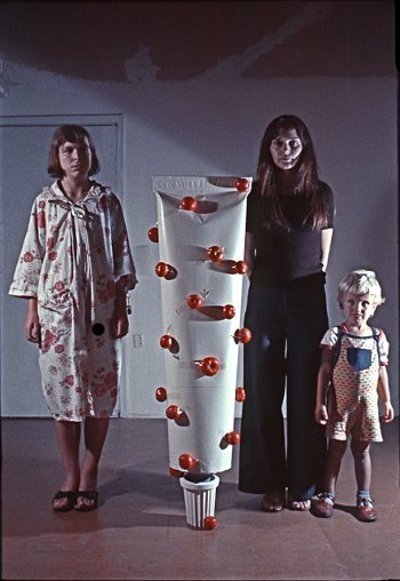KwieKulik
dal 15/12/2009 al 6/2/2010
Segnalato da
15/12/2009
KwieKulik
BWA Awangarda Gallery, Wroclaw
The title of the exhibition, Form is a fact of society, refers to efforts towards reciprocal engagement with artistic discourse and forms of social organization. The show is the first serious attempt to illuminate one of the most important artistic phenomena of post-war Polish art: the artistic duo Zofia Kulik and Przemyslaw Kwiek and their collective works from 1971 to 1987. As part of their agenda, KwieKulik sought to reconcile artistic praxis with everyday life. This show also highlights the couple's pioneering approach to film, photography, and multi-screen slide projection.

The exhibition presented at the BWA Awangarda Gallery in Wrocław is the first serious attempt to illuminate one of the most important artistic phenomena of post-war Polish art: the artistic duo Zofia Kulik and Przemysław Kwiek (KwieKulik) and their collective works from 1971 to 1987. KwieKulik's work, which is radically unique in the history of the neo-avant-garde in Central Europe, is seen through a prism of their socio-political engagement and their uncompromising, bold criticism of their surrounding reality.
KwieKulik, the talented students of architect Oskar Hansen at the Academy of Fine Arts in Warsaw, were the first artists to conceive a radical political turn to Hansen's theory of the Open Form. Since the beginning of the 1970s, KwieKulik pioneered the transformation of artistic practice into one of social experimentation, more laboratory than studio, creating artistic groups that promoted values and models of a non-authoritarian social system. As part of their agenda, KwieKulik sought to reconcile artistic praxis with everyday life. In a particularly merciless fashion, the duo fulminated against conformism, lack of ideals, cynicism, and hypocrisy: the 'qualities' that were the fundamental compound of community life in the People's Republic of Poland.
The title of the exhibition, Form is a fact of society, refers to efforts towards reciprocal engagement with artistic discourse and forms of social organization, which are essential in KwieKulik's practice. These efforts, when acknowledged today, trigger pertinent questions in a contemporary debate: What constitutes society? What forms determine its functioning? How can we use these forms to build a democratic community? Such an attitude towards KwieKulik's work, twenty years after the political transformation in Poland, allows us to rethink our attitudes towards the socialist past. It permits us to draw a line between the undemocratic, repressive communist state and the emancipated dimension of the community-based, socialist ideals represented by KwieKulik. Furthermore, it creates means to reclaim these ideals and engage their contemporary critical potential.
This exhibition also highlights the couple's innovatory and pioneering approach to film, photography, and multi-screen slide projection, which epitomize their unique variation of expanded cinema. It demonstrates the use of photography and video documentation of process-based, ephemeral actions and illustrates KwieKulik's unconventional, avant-garde artistic strategies that combined scientific rigor with an openness for improvisation. Such as: 'intuitive interactions', 'visual games', 'to-camera activities', 'parasite art', 'earn and create', 'art consciously bad', etc.
Form is a fact of society is the result of a research project spanning a year and a half, initiated by the BWA in Wrocław with the objective of an in-depth multifaceted study of KwieKulik's archives. The research project will culminate in the first monograph dedicated to KwieKulik, co-produced by BWA Wrocław, the Museum of Modern Art in Warsaw as well as Kontakt. The Art Collection of Erste Bank Group in Vienna and edited by Georg Schöllhammer and Łukasz Ronduda. The publication, planned for 2010, will be designed by Ludovic Balland and Błażej Pindor.
Image: Action with a tube (detail), PDDiU, Warsaw 1975, photo by Przemysław Kwiek. From left to right: Urszula Kwiek, Zofia Kulik, Maksymilian Dobromierz Kwiek
Press room and information about the gallery:
Zofia Walkowicz z.walkowicz@bwa.wroc.pl tel. +48 71 7902586
Opening 16 December 2009 at 19:00
BWA Awangarda Gallery
Wita Stwosza 32, 50-149 Wrocław, Poland
Opening hours
16 December 2009 – 7 February 2010
Tuesday to Sunday, 11:00 – 18:00



